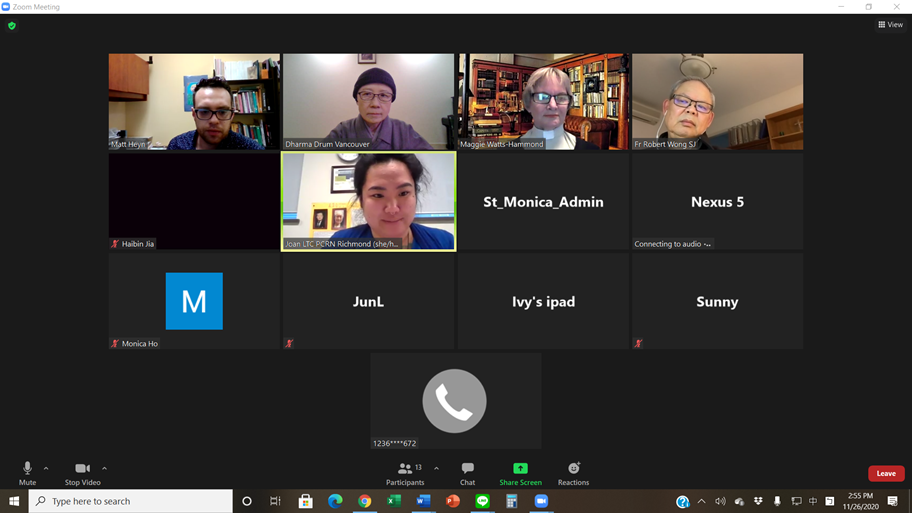On November 26th, the inter-faith discussion was held by Richmond Integrated Hospice Palliative Care Team under the Vancouver Coastal Health and facilitated by Rev. Matthew Heyn, Spiritual Health Clinical Educator from the Richmond Integrated Hospice Palliative Care Team.
Venerable Chang Wu, representing Chan and Pure Land Buddhism, along with Rev. Maggie, representing Protestant Christianity, and Father Wong, representing Roman Catholicism, were invited as panelists to share insights on their respective faith’s perspective on end of life and spiritual/religious traditions, offering valuable insights to healthcare professionals on how to care for their patients and families. This discussion, conducted via Zoom, allowed for interactive discussions between the panelists and approximately 40 participating healthcare professionals. The discussion was centred around three main topics: 1) basic beliefs around end of life, 2) story of a congregant/parishioner that each representative assisted with in their dying process, and 3) important rituals/practices when death is imminent.
The discussion began with the first topic: Basic beliefs around end of life. Venerable Chang Wu, indicated that, from the Buddhist belief, “death is not truly the end of life, [and] there will be future lives.” Therefore, Buddhists view the end of life as it being “just a leg of a journey, [which continues] after this life.” She further said that “there are reasons and purposes that we come to this world”, and “when the time comes for us to leave, we leave with empty hands.“ As Buddhists, we want to help individuals, when facing death, to move on to their journey as smooth as possible.” Following Venerable Chang Wu, Rev. Maggie indicated that end of life is a natural process that happens to everyone”. Christians believe that “God is with us in bad and evil situations, even during the process of death”. This belief therefore relieves the feelings of fear and loneliness experienced by the patent. Finally, Father Wong responded that, in Catholicism, death also signifies the beginning of a new life.
Next, the panelists combined their responses to the second and third topics and shared their experiences on the importance of their religious rituals when assisting their congregants/parishioner in their dying process. Venerable Chang Wu indicated that the tradition of chanting Buddha’s name, Amitabha, is an important pillar in Buddhist ritual when death is imminent. It helps to clear off the patient’s anxiety, attachment and fear and therefore be able to have a calm, peaceful and clear mind” during the dying process. It not only helps the deceased but also bring comfort and peace to their family. In addition to the chanting, meditation practices can be applied and useful. In addition to the chanting, Buddhists also apply meditation practices in this process and find very helpful.
Similarly, Rev. Maggie also shared that singing plays an important role in Christian ritual in the dying process. However, different from Buddhism, other practices such as healing touch, healing prayer, communion, and baptism are also important parts of the Christian ritual. She emphasized that, in Christianity, the patient is baptized into the faith community and therefore, the presence of fellow congregants is critical. In addition to communion and baptism in Christianity, Father Wong indicated that receiving blessings and making confessions to the Pastor are key pieces in Catholic ritual when death is imminent. However, as emphasized by Father Wong, the ritual of confession is often confidential, hence, only the Pastor should be present with the patient during this time.
Despite their different beliefs around end of life, the common theme between the three panelists is to offer support and comfort for not only the patient, but also their families with an aim of creating a warm and -free-of-fear environment for the patient and a caring relationship that they are supported emotionally and spiritually.
During the Q&A, many questions were raised and directed to Buddhism. Especially for the healthcare provider and service staff, by conveying the Buddhist perspective and practice to healthcare providers and workers, not only will they learn how to take care of Buddhist patients, but the patients will also feel respected and properly taken care of. We want to thank the organizer for hosting such a beneficial event and welcome more of this kind to come in the future.
Written by Monica Ho
Default image (2nd thumbnail of the upper row): The first row from left to right: Rev. Matthew Heyn, Ven. Chang Wu, Rev. Meggie Watts-Hammond, Fr. Robert Wong







